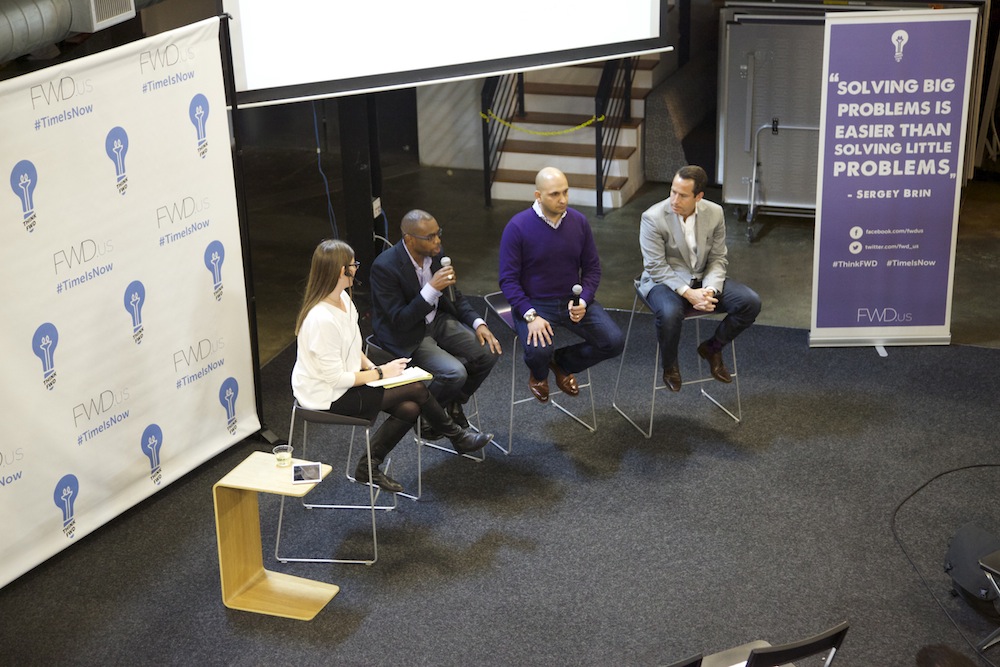“A great engineer is worth 100 average engineers,” said Mark Zuckerburg.
At this FWD.us event, the discussion covered the bottlenecks of our education system, the limitations of our visa programs, and the societal value of SnapChat, but it was the employer’s demand for people that underlined this “Future of Talent” panel. The panelists were SmartRecruiters COO Brett Queener, Level Playing Field Institute Executive Director Jarvis Sulcer, General Assemb.ly West Coast Admissions Manager Danoosh Kapadia and Engine Advocacy Executive Director Julie Samuels.
In the tech space, immigration is a hot topic, as many great software engineers from around the world want to work in America. There’s a strong track record. Elon Musk. Sergey Brin. Satya Nadella. The Immigration Policy Research Center reported that from 1995 to 2005, over 52% of startup companies in Silicon Valley had at least one immigrant founder. Since its founding, America has grown stronger by attracting the best and brightest from around the world. And many of the best and brightest are working in the tech industry. Julie Samuels explained why:
“One of the reasons I’m excited about tech: giving people the tools to solve problems they already know.” @juliepsamuels #ThinkFWD”
— Mary (@MaryLopez4life) March 27, 2014
But the issue of diversity is far bigger than where we are from. Brett Queener, citing his experience of what Salesforce looks for in future innovators, pointed out that changing the world requires a diversity of skills, intelligence, and emotional intelligence:
“If you’re looking to innovate, you’re looking for people with a high EQ, not just a high IQ,” says @Bqueener. #THINKfwd. — SmartRecruiters (@SmartRecruiters) March 27, 2014
Jarvis Sulcer emphasized that we need to go to the root of the problem, empowering equal opportunity as early as possible in a child’s education:
“There is a bigger gap than skills gap. Opportunity gap.” @JDSulcer It’s a bigger issue. #MoveFWD #ThinkFWD
— Diana Park (@sparkdiana) March 27, 2014
And Danoosh Kapadia – with a zen like wit – focused on practicality of not only our childhood education programs, but also on the continued education of established workforce:
“We’re not teaching you how the engine was built, we’re teaching you to drive the car.” @danooshk #ThinkFWD
— Amy Koch (@theamykoch) March 27, 2014
As Mark Zuckerberg, one of FWD.us’ founding members, told Time Magazine, immigration is in the heart of America’s heritage, “My great-grandparents came through Ellis Island. My grandfathers were a mailman and a police officer. My parents are doctors. I started a company. None of this could have happened without a welcoming immigration policy, a great education system and the world’s leading scientific community that created the Internet.”
Talented workers – and the search for those talented workers – spans far beyond tech. Citing a ManPower survey, Queener pointed out that the three hardest jobs to fill in America are skilled tradesmen, sales representatives, and drivers. The discussion was great, but the big questions remain: Is the American education system preparing young people for the talent demands of employers? Are the employers prepared to find the talented people that are out there? It starts with identifying what talent the business needs:
Profiles in demand = people who are adaptable, has a high EQ, risk-taking, according to @SmartRecruiters‘ @bqueener #ThinkFWD
— FWD.us (@FWD_us) March 27, 2014

